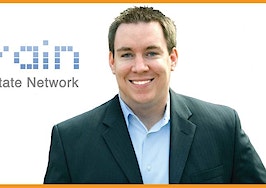Zillow had a gnarly few days last week. Its CFO, Chad Cohen, resigned, and its stock tumbled another 10 percent — losing 7.7 percent on Friday alone, the day the overall market recovered from its Greek migraine. And, as more gook oozes from the Trulia merger, the deal has a stench to it.
Will Zillow get through this knothole? Look further down the road to see the prize. Short term, it’s been ugly, but long term, Z may be more promising.
With the MLS data feeds pouring into its database like Seattle Seahawk fans into CenturyLink Field at game time, Zillow’s plucky quest for listings is coming to a close. Zillow has home listing coverage from the source — local MLSs — which means less pandering to brokers and franchises to fill in the gaps.
Next. With 140 million or so unique visitors snooping around Zillow each month, many agents may not need Zillow, but they will want it. Higher lead conversions rates and a healthy return on investment (ROI) add to the appeal.
Tipping point? Yes, because home sellers are beginning to ask, “Will my home be listed on Zillow?” Some sellers may not know what that means, but agents may be risking a listing when they cannot explain how they leverage the online platform. Smart brokers are helping their agents do that — not just advertise on Zillow, but exploit it.
ROI is all that matters
Indeed, a growing number of agents and brokers are jumping on the Zillow bandwagon. They are getting the necessary ROI, creating an industry tipping point. More on that later.
The naysayers? Despite the industry noise around “evil” Zillow, the consumer tipping point means broker and agents cannot boycott Zillow without passing on some upside in their business. And consider that these one-off rebellions make no difference to Z’s listing coverage or its revenue. The rap about Zillow flipping its business model is like hearing Pharrell Williams’ hit song “Happy” again — it’s an overplayed tune and borderline annoying.
Here is where it gets interesting and how Zillow can fit into its oversized valuation and could grow into a mega-valued enterprise over the next couple of years.
A bright, savvy, first-year Columbia MBA student, Brandon Cohen, provided many insights. He is doing an independent semester-long research project on Zillow (not for Zillow).
When he first contacted me, he was cynical about the prospects for Zillow, comparing it unfavorably to overseas online real estate models that seemingly have a richer business model, much larger valuations for their overall market size and very profitable companies. But with a fresh set of eyes, Cohen ran the numbers, combed over the company’s public information, chased down industry experts and cold-called Zillow customers.
He then changed his opinion about Zillow’s business model being a disadvantage for growth and came to believe that the company had huge upside. (FYI: He was not influenced by the Zillow storytellers; he has not talked to them yet.)
His methodical approach persuaded me to take another look at the persistent Zillow question: Is it merely a well-crafted story, or is it an enterprise with an explosive valuation? (Another FYI: My changing attitude towards Zillow is like New York weather — hot and cold, hot and cold, hot and cold.) Although Cohen’s research is not complete, he had sufficient findings to make some preliminary conclusions for you to slice, dice, take advantage of or ignore.
Pricing power
Zillow has pricing power, not because it has a monopoly but because of the ROI for the agents and brokers who invest time and money in it — not for those who buy a few ads, loiter for results and then whine about Zillow. But the ROI is there for those who figure out how to work the Z system, by pushing for higher conversion rates on their ad buys. They intelligently manage their leads, revel in agent ratings, methodically adjust their spend and fervently tweak their profiles and ads including pictures (the word is that blondes convert better).
A particularly compelling story came from a Silicon Valley broker who invested in Zillow six months ago after observing his competitors doing the same. He bought Z advertising “in a big way,” dishing out $8,000 a month. He hit the jackpot, purportedly generating an extra $40,000 a month in commissions since starting his Zillow campaign. His story is not unique.
Part of the magic: The broker more than covers his costs on buyer prospects, which accounts, on average, for nine of 10 leads. But N0. 10? Bingo! A seller, a listing.
“While this broker doesn’t need Zillow, he wants Zillow,” Cohen said.
The important number is the ROI, return on investment.
“Zillow has a long runway for inventory growth and significant pricing power, not because advertisers need Zillow, as the short sellers accurately point out they don’t, but because advertisers want Zillow because it generates a 6X return on investment,” writes Cohen in the first draft of his class essay.
Price hikes, like it or not
Here is the pay day for Zillow: It can raise prices because the ROI is so good, which is why it is doing it. Realtor.com is allegedly increasing its prices 30 percent across the board for the same reason. Zillow has been more surgical, because unlike Move, it is not a FOREE — a “friend of the real estate estate establishment.” Plus, getting listings coverage was step one, and Zillow was willing to forgo price increases to avoid any risks to that fragile mission.
Now, price hikes are merely a matter of time. Based on the ROI, Cohen says that Zillow can potentially double its prices over the next few years, which would result in a 50 percent margin, putting the company on track to fulfill its valuation expectations.
Uber-like valuations could then be realized when Zillow continues to increase traffic, creating more inventory and making product improvements to push up the conversion rate — or better yet attract more sellers. Then, the company’s future is made.
So where are the gaps in Cohen’s argument? He understands the real estate 80/20 rule and has recently reached out to a random sample of 60 agents from the top 20 markets in the country to make sure he hasn’t talked only to the 20 percent, but he has not yet spoken with most of them. That is important because we all know the marginal agents — who buy ads after getting pitched from Zillow’s dialing-for-dollars call center — churn out and do not increase their buy; they cancel it. Zillow has 103,000 agents registered on its platform who pay for ads, but quite a few are missing a fry or two in their Happy Meals.
Cohen says that the top producers are buying more and that should make up for any gap with low performers. One data point from the last Zillow investor call: CFO Chad Cohen said that 63 percent of new sales bookings came from existing premier agents. Plus, agents in the future can team up with emerging tech-savvy brokerages like Washington, D.C, broker Samer Kuraishi. He has a team of 44 agents who did an estimated $2.6 million in gross commissions in 2014 from Zillow leads.
Cohen concedes, however, that, “If the average ROI of a Zillow advertiser is significantly lower than I estimated, then I will also be wrong on pricing power, which is critical to margin expansion.”
Another miss in Cohen’s thinking could be that agents have a wallet size limit. No matter what the ROI, many agents are more comfortable growing their business from referrals instead of investing in a big lead fire hose, which takes them out of their financial comfort zone. Again, Cohen believes these types of agents can be successful on Zillow if they team up with a broker or other agents in teams who are working Z relentlessly. Hmmm … not sure about that.
The stock shorters also point to the Upstream project, which could give brokers more control over their listings. But the Upstream principals, including NAR, are keenly aware of restraint of trade dangers, which should prevent any ugly moves on restricting listings to Zillow. Plus, its consumer clout would make such moves folly.
Cohen dismisses the impact of the insider deals Zillow struck with the big brands like Realogy and Keller Williams that take inventory off the market because those deals are already baked into Zillow’s numbers. Plus, let’s assume the deals don’t go on forever. Nevertheless, this is a hard one to unravel because we do not have enough information about these deals.
Another outlier may be Redfin, which competes right alongside Zillow. Just type any address for any home in the U.S., and you are certain to see Redfin in the first, second or third slot.
And what about realtor.com? That’s another research paper.
The end game
Cohen argues that at a high level, three important characteristics in the Zillow formula take care of its threats: network effects, economies of scale and user habits.
- Network effects: The larger the audience, the more engaged consumers and real estate agents will be, which should leads to more business activity, more listings, more information and more reviews, all of which make consumers even more interested in viewing Zillow, increasing the audience.
- Economies of scale: Zillow has the best user experience and most recognizable brand in the industry because it benefits from economies of scale. It spends hundreds of millions of dollars on technology and advertising at a lower cost per user than its competition because of the size of its audience.
- User habits: Because Zillow is free to users, it’s hard to get them to switch to a competing product without being much better. Simply being as good, or slightly better, isn’t enough to get the average user to delete the Zillow app and download a new one.
But Cohen is realistic. “While the barriers to entry are strong, Zillow is no Facebook. If Google wanted to spend a couple of years and a couple billion dollars building and marketing a competitive site, it would theoretically be possible.”
Nevertheless, after studying comparable sites overseas that have dominant market share despite numerous threats from well-capitalized entrants, he concludes that “once a property portal gets dominant consumer mindshare, it is very hard to compete.”
Game over? (I didn’t state that, I just asked the question.) Now what do you think?
Onward!
Inman Connect San Francisco is right around the corner — register now and save $200!







